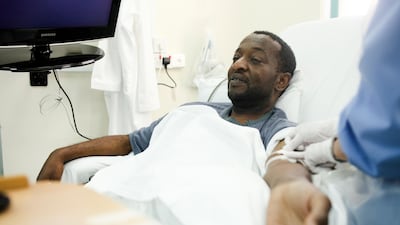Doctors in Abu Dhabi are urging patients to have their health checked as concerns increase over high levels of chronic kidney disease.
A two-year study involving more than 400,000 patients in the capital raised the alarm over the need for early detection.
Nearly 1.5 million blood test from patients in the Seha network were examined from December 2019 to December 2021.
The report found 19.1 per cent of those samples identified stage 2 chronic kidney disease, with 2.8 per cent at stage 3, 0.5 per cent at stage 4 and 0.4 per cent at stage 5.
director and chief executive of kidney care at Seha
The five stages of CKD refer to how well the kidneys are working. Kidney disease can get worse with time.
In the early stages of 1 to 3, kidneys are damaged but are still able to filter waste out of the blood. In the later stages of 4 to 5, the kidneys must work harder to filter blood and may stop functioning altogether.
Prof Stephen Holt, director and chief executive of kidney care at Seha, the UAE's largest healthcare network, was one of the authors of the study.
“Sadly we are not doing well. We have a higher rate of kidney disease than the rest of the world if we are looking at the current research,” he said.
Focus on prevention
“End-of-stage kidney disease has a worse prognosis than most cancers and people don’t know this. It makes me upset when I see people who could have avoided this and don’t know about it.”
Prof Holt, who was speaking on the sidelines of the International Conference for Initiatives on Organ and Tissue Donation and Transplantation in Abu Dhabi this week, spoke of the contributing factors behind the worrying levels of kidney disease, including diabetes and hypertension.
He said people can lose up to 90 per cent of their kidney function before they realise they need medical help.
“This is why we urge people to get a kidney function test. It is an easy test. We also want to promote a healthy lifestyle,” he said.
He said people should regularly check their blood pressure and highlighted how cardiovascular disease can lead to kidney problems.
Life-saving support
Seha Kidney Care provides comprehensive medical support for patients at its health facilities in Abu Dhabi.
So far this year they have carried out 57 kidney transplants, in which half of the organs donated were from deceased donors.
About 90 patients are currently on the waiting list for a transplant.
About 1,400 patients require kidney dialysis.
Kidney dialysis is the process of removing excess water, solutes, and toxins from the blood in people whose kidneys can no longer perform these functions naturally.
“Kidney transplants make a huge difference for patients who are on dialysis. We would like to take patients off dialysis and on to something that could sustain them for many years,” Prof Holt said.
“If we had more kidneys we would be able to transplant everyone. That would be a dream.”
Seha Kidney Care has introduced overnight dialysis services for the first time.
This allows for longer periods of treatment to be carried out while the patient sleeps.
There are currently eight patients on overnight dialysis.
Screening is crucial
Dr Muriel Ghosn, staff physician in the nephrology department at Cleveland Clinic Abu Dhabi, said it is easy to be tested for kidney problems, and could be vitally important.
"Screening for kidney diseases is important because renal failure is asymptomatic and the only way to detect renal insufficiency and identify risk factors for deterioration of kidney function is via blood and urine tests, which are easy to get."
She said taking this step "allows for many simple protective strategies to be implemented that will help preserve and even improve kidney function over time".
"This includes adequate diabetes and hypertension control", she said, as well as "the avoidance of medications or supplements that affect negatively the kidney function".
Dr Sagar Jujjavarapu, a consultant nephrologist for Healthpoint in Abu Dhabi, said hypertension, diabetes and obesity are key triggers for kidney disease.
"Most people with kidney disease are not aware of their condition and do not exhibit symptoms until the disease reaches an advanced stage," Dr Jujjavarapu said.
"Early detection of kidney disease helps clinicians to deliver effective treatment at earlier stages of the disease to prevent further progression, which could at times lead to kidney failure."









